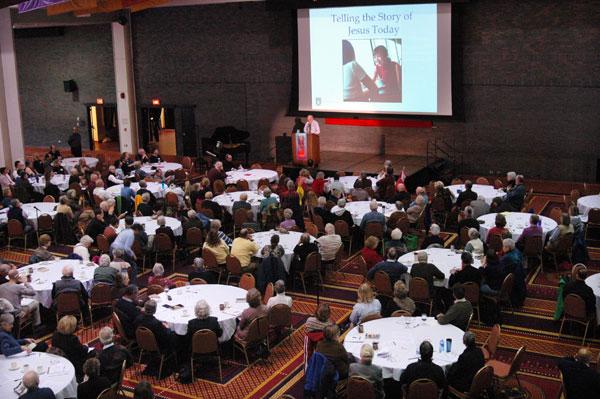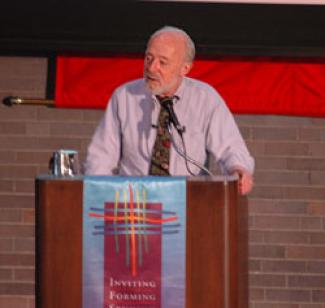See photos from this event>> | Watch video of session 1>> | Watch video of session 2>>
Some 400 people gathered at Boston University on March 15, the eve of Holy Week, to hear New Testament scholar Marcus Borg talk about how to talk about Jesus.
“The story of Jesus is the most important story I know, and it matters greatly how we tell it,” Borg said. “An understanding of Christianity that was very common a generation or two ago has become unpersuasive to many people in our time.”
In two talks, based in part on his recent book, Jesus: Uncovering the Life, Teachings and Relevance of a Religious Revolutionary, Borg outlined common depictions of Jesus and how they shape people’s understanding of Christian life: Jesus as a substitute sacrifice, thus a repeated cycle of sin, guilt and forgiveness for believers; Jesus as Superman, deprived of his humanity; or Jesus as simply a great teacher. “To reduce the message and significance of Jesus to something that could be put on a Hallmark greeting card is probably inadequate,” Borg said.
Instead, he suggested a more historical and metaphorical way of telling Jesus’ story, one that he said has emerged from the last two centuries of mainstream biblical scholarship. It sees the Gospels as a developing tradition, combining memory and testimony, memory and metaphor—“the more than factual meaning of language.”
He sketched out a pre-Easter Jesus who proclaimed unmediated access to God and whose passion was for realizing God’s dream of justice and peace for the earth. “His message and activity about the way and the kingdom—what life would be like on earth under God’s lordship instead of under the lordship of the rulers of this world—are what made him a religious revolutionary,” Borg said.
He asked his audience to consider whether Christian life is primarily about believing in Jesus or following Jesus. “The modern, post-1600 meaning of believing in Jesus has very often come to mean believing statements about him, whether biblical or doctrinal,” he said. “To believe in the pre-modern meaning of the word is to belove him and follow him. In short, believing in Jesus meant loving Jesus, and to love Jesus includes loving what Jesus loved.”
Jesus’ message to his followers today, Borg concluded, would be: “Center in God, and change the world. It’s as simple and challenging as that.”
A live Webcast of the event made it possible for small groups to participate in the annual spring learning event from remote viewing sites organized in places as varied as Falmouth, Hanover, Bath, Maine, and Biloxi, Miss.; about 40 more viewers logged on individually for the full program.
The day’s offering of $9,514 was designated for the Diocese of Jerusalem’s St. Andrew’s Housing Project in Ramallah.
Borg, an Episcopalian, is the Hundere Distinguished Professor of Religion and Culture at Oregon State University. Among his bestselling books are Meeting Jesus Again for the First Time, The God We Never Knew, The Meaning of Jesus: Two Visions (with N. T. Wright); and Reading the Bible Again for the First Time. He has been national chair of the Historical Jesus Section of the Society of Biblical Literature, co-chair of its International New Testament Program Committee and president of the Anglican Association of Biblical Scholars.
During his opening remarks, Bishop M. Thomas Shaw, SSJE took apparent pleasure in surprising some in the room with the news that they are evangelists: “More important than what we are doing here to prepare ourselves for Holy Week is that Dr. Borg has come to help us articulate our own faith life. You know, Mary Magdalene and Peter and James and John, they all went out in the first century to spread the good news of Jesus Christ,” Shaw said. “And you and I, every one of us in this room today and in all the places that this is being Webcast, we’re the 21st-century disciples of Jesus Christ that are meant to go out and spread the good news to a broken world today.”
See photos from this event>> | Watch video of session 1>> | Watch video of session 2>>


